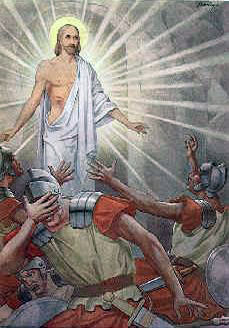podcast 284 – Does the Bible Teach that God is a Trinity? Cole-Tuggy Dialogue – Part 3
Does the famous “Great Commission” passage at the end of Matthew teach that the one God is a Trinity?
Does the famous “Great Commission” passage at the end of Matthew teach that the one God is a Trinity?
In this episode Pastor Sean Finnegan and I discuss biblical spirit-talk: “the Holy Spirit,” “the Spirit of the LORD,” “God’s spirit,” “the Spirit of Christ,” etc. Sean helpfully distinguishes four types of spirit-talk in the Bible, giving many examples from both testaments. We also discuss traditional catholic arguments for the Holy Spirit being a third divine person in addition to the Father and the Son,… Read More »podcast 25 – Pastor Sean Finnegan on “the Holy Spirit” – Part 1
Apologetics is hard, because it’s hard be an expert on more than a few subjects. There’s a strong pressure to just recycle bad arguments and wrongheaded claims propounded by other apologists.
Thanks to our friend Alvin Kimel for linking my post Jesus, God, and an inconsistent triad. Check out his post and the ensuing discussion here. Unfortunately, the fact that I’m a unitarian seems to distract him from the actual purpose of the post. He says, In this article he hopes to persuade us that the classical trinitarian doctrine is logically absurd. No. That is not… Read More »dialogue on God, Jesus, and identity with Alvin Kimel
Is the question absurd? Or does it make sense in light of New Testament teachings?
The word is “Therefore…” When you are making a deductive argument, this means that what you are about to say logically follows from (is implied by) what you have just said. That is, if the former part were to be true, what you’re about to say must also be true. A non sequitur (Latin for: “it doesn’t follow”) is an invalid argument, one in which the premises don’t imply… Read More »The Trinity Explained (with Reason)
How can they respond to an argument which shows that they collapse the Father/Son distinction?
Could each divine “Person” of the Trinity be either an attribute of God or God together with an attribute?
Sincere advice on how to move past a merely verbal defense of “the Trinity.”
How does one objectively evaluate a definition of a concept, e.g. trinitarian or unitarian?

Of all the ancient catholic “fathers” I’ve read, Origen (c.185-254) is the most impressive as a scholar.
It’s not that I usually agree with him – any non-Platonist is going to choke on many of the dishes he’s serving, and I think that most today would take issue with some his ways of interpreting the Bible. But he has vast knowledge, he makes pretty careful distinctions, he knows how to argue, and is just a much more developed and original thinker than most. Any contemporary who was going to square off with him either did or should have considered him a formidable opponent.
He wrote, or rather dictated, a vast amount – evidently, he did little else. Some think he may have been the most prolific person in antiquity. We still have a fair number of texts from him.
He’s historically important for many reasons, but for this post, what’s most important is that in the 3rd century he was considered a stalwart of mainstream (“catholic”, or “proto-orthodox”) Christianity.
Lately I’ve been reading Origen’s Commentary on John, as translated by Ronald E. Heine, who by way, I have found very helpful. He too is a first-rate scholar.
Evidently, passage here is directed against certain monarchians who thought (or at least, were alleged to think) that the Father = the Son, i.e. that the Son is the Father himself and vice versa. This passage struck a nerve with me, as it reminded me of conversations I’ve had.
The references in brackets are from Heine’s footnotes.Read More »Origen: the Son is not the Father
Its purpose is to equip you to think through these disputed theological and biblical issues. Appropriately, it’s again available in Three formats.
From Dr. Anatolios’s book Retrieving Nicea: The Development and Meaning of Trinitarian Doctrine, describing the theology of Eusebius of Caesarea (c. 260 – c. 339): Eusebius conceives of the Spirit as the next level down in the chain of being and willing that descends from the Father and the Son. While he is ambiguous on the neuralgic question of the creaturehood of the Son, he… Read More »Anatolios on Eusebius on the Holy Spirit
In this episode I talk with Professor Timothy Winter (a.k.a. Shaikh Abdal-Hakim Murad), an Islamic theologian at Cambridge University. He’s the author of a chapter called “The Trinity is Incoherent” in the 2013 collection edited by J.P. Moreland, Chad Meister, and Khaldoun A. Sweis, Debating Christian Theism. It was paired with a chapter by Dr. Tom Senor, a Christian philosopher from the University of Arkansas, called “The… Read More »podcast 46 – Professor Timothy Winter’s Islamic perspective on the Trinity
Suppose you want to really study my entry “Trinity“ in the Stanford Encyclopedia of Philosophy. If you’re like me, when you want to really read something, you’ll print it out (and then proceed to destroy it with a pencil and a highlighter). And if you do print it all out, it’ll make your printer burst out in tears. The whole thing, with supplementary discussions, comes… Read More »“Trinity” in paperback form
This episode features this 2013 discussion/informal debate about Jesus in Melbourne, Australia, featuring a trinitarian Christian (Dr. Bernie Power), a unitarian Christian (Pastor Steve Katsaras), and a Muslim (Mr. Shahir Naga). The audio is a little rough; I’ve cleaned it up a little for this episode. Here is the video from which this audio is taken. Many thanks to the City Bible Forum in Melbourne… Read More »podcast 6 – the “Jesus: Prophet, Messiah, God?” Debate in Melbourne, Australia